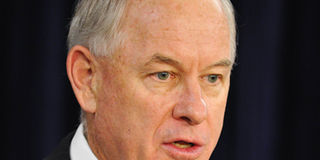US urges Kenya to resolve nominees row

This December 1, 2010 file photo shows US State Department spokesman Philip J. Crowley as he speaks during a press conference at the Foreign Press Center in Washington, DC. In a written statement on February 20, 2011 Crowley acknowledged Speaker Kenneth Marende's ruling and said it highlighted the importance of cooperation and transparency as Kenya makes tough reforms. AFP PHOTO/Mandel NGAN
WASHINGTON, Sunday
The United States on Sunday urged Kenya’s leaders to resolve a judicial appointment row that has rattled the shaky coalition government formed in 2008 to end deadly post-election violence.
President Mwai Kibaki’s naming of a new chief justice, attorney general, director of public prosecution and budget controller last month sparked a bitter dispute with Prime Minister Raila Odinga who said he was not consulted. (Read: Kibaki names new Chief Justice as ODM protests)
Kenya’s Parliament Speaker ruled on Thursday that the nominations were unconstitutional but Kibaki is digging his heels in and wants the constitutional court to decide. (Read: Marende: Sorry, go back and try again)
In a written statement, US State Department spokesman Philip Crowley acknowledged the speaker’s ruling and said it highlighted the importance of cooperation and transparency as Kenya makes tough reforms.
“Progress can only be achieved if the president and prime minister work together in a collaborative way to implement the constitution, particularly to ensure that appointments are made in a transparent and credible manner,” Crowley said.
Around 1,500 people were killed in the aftermath of the disputed December 2007 presidential poll and hundreds of thousands were displaced.
A February 2008 power-sharing deal between Odinga and Kibaki, the incumbent president, ended Kenya’s worst post-independence unrest and prescribed wide-ranging institutional and legal reforms.
“The National Accord — which is written into the constitution’s transitional provisions — calls for the two principals to consult with a view to achieving compromise on key issues,” Crowley noted.
He hailed the August 2010 adoption of Kenya’s new constitution as a “major milestone” but called on Kenya’s leaders to “involve civil society in the constitutional implementation process in order to achieve national consensus.
“Full implementation of the letter and spirit of the constitution is crucial to realise the promise of a democratically stable and prosperous future for all Kenyans.”




